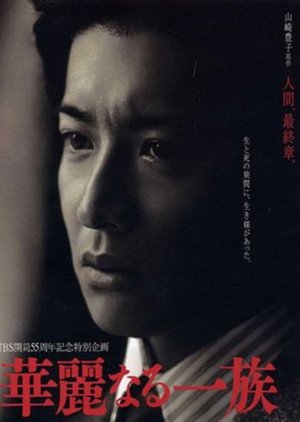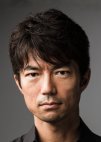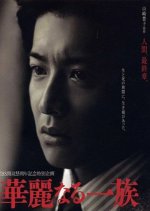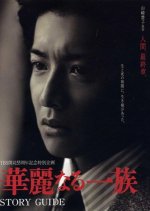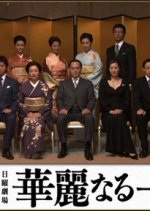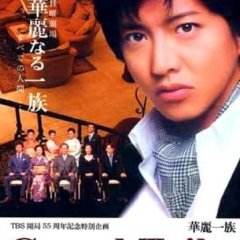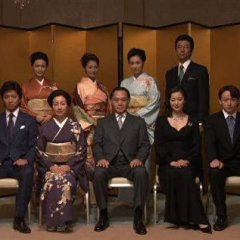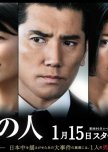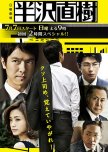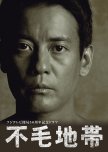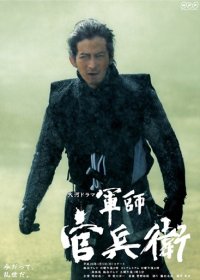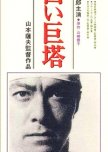 Takuya Kimura's Hair Style Evolution
Takuya Kimura's Hair Style Evolution Set in the 1960s, it depicts the inside story between bureaucrats, politicians and big businesses over a bank merger revolving around the family discord between Manpyo Daisuke, the owner and president of Hanshin Bank, and his eldest son, Teppei. (Source: AsianWiki; edited by MyDramaList) Edit Translation
- English
- Português (Brasil)
- magyar / magyar nyelv
- dansk
- Native Title: 華麗なる一族
- Also Known As: The Family , The Grand Tribe , The Grand Family , A Splendid Family
- Director: Yamamuro Daisuke, Fukuzawa Katsuo
- Screenwriter: Hashimoto Hiroshi
- Genres: Business, Drama, Family
Where to Watch Karei naru Ichizoku
Subscription (sub)
Cast & Credits
- Kimura Takuya Main Role
- Kitaoji Kinya Main Role
- Suzuki KyokaTakasu Aiko [Manpyo Estate's manager]Support Role
- Yamamoto KojiManpyo Ginpei [Second son and child / Loan section chief of Hanshin Bank]Support Role
- Nakamura ToruMima Ataru [Ichiko's husband / Deputy director / Ministry of Finance]Support Role
- Fukiishi KazueMima Ichiko [Eldest daughter / 3rd child]Support Role
Reviews

The grandiose nature of this drama can initially feel a tad overblown before you are engaged by the plot; every character is introduced on screen in each episode with text denoting their name and association to other characters or establishments, the music is mostly orchestral, with a good choice in The Eagles' "Desperado" thrown in, and sweeping overtures throughout the series give the whole thing a sense of huge importance. This, combined with the enthusiasm and respect of those who support the central character feels slightly false at first. Only very slightly.
This foundation is well laid, however, as the story that unfolds is so engaging, the enemy so cruel and terrible in the face of such unceasing, hopeless optimism, that anything less is scale would fail to support it through to the final climax.
The story is a sad one, but necessarily so. The characters who give the drama its light alleviate the pain of the circumstances forever falling upon them.
The acting is sublime, Kimura Takuya has not crafted such a reputation out of thin air after all, but for me it is Kitaoji Kinya's Manpyo Daisuke that steals the show, the nuances of his expression so readable whilst retaining the stone-faced airs of a powerful executive.
For me, whilst immediately impressed by the quality of the drama it needed an initial investment of time; I didn't feel compelled to watch episode after episode, although by episode 6 this feeling changed and I was very keen to progress with the story. Like all dramas that feel this way, the investment of time into a few well thought-out starting episodes, that do not spoil us with too much all at once and establish characters and circumstance evenly and with skill, is worth the payoff and more.
What's more, the social setting of 1960's Japan is interesting, a time of great transition for the country.
In regards to my average score for rewatch value, I hasten to add that my PTW is getting so long, it would have to be the most incredible drama for me to watch it again before deciding to watch anything else. Others may enjoy watching the same thing many times, but for me I am keen to try new things, so please don't let that put you off.
What's more, some scenes in this drama were so striking I am certain that they will be very clear in my memory for some time to come.
If I could give it a score out of 10 to recommend you watch it I'd give it a 10; it's good to see the serious and highly professional side of the drama world amongst all the dreamy good stuff that we all enjoy!
I urge you all to give this one a go!
Was this review helpful to you?

Was this review helpful to you?

